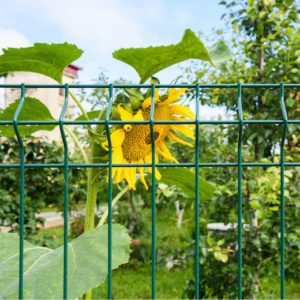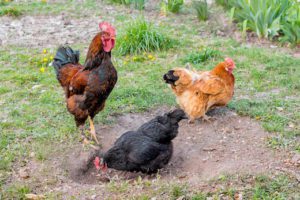There’s a quote that has recently gone viral among the gardening community that simply states, “If something is not eating your plants, then your garden is not part of the ecosystem.” This statement speaks to the idea that growing food does best when it’s part of an overall system and not a highly ordered and chemical laden process.
Of course, we grow food because we want to feed ourselves, not the potentially devastating pests which can quickly wreak havoc if left unchecked. As this quote implies, there are ways to have your cake and eat it too, that is, keep pests at bay without taking your garden out of the ecosystem. Here are four great ways to keep pests out of your garden!
Adding Fencing Around Garden Beds
Okay, okay! We know this might be extremely obvious to many of our readers, but the truth is, some pests simply cannot be stopped any other way. Ask anyone who has ever tried to keep a garden on the outskirts of a forest if they did so successfully without a fence to keep out their dear, deer friends. It’s nearly impossible.
Fences are fantastic for keeping out deer, rabbits, bears, and other critters that might find your tasty fruits and vegetables a treat along their journey. If you keep chickens, it’s almost mandatory that you keep them out of your garden with fencing and only letting them in to clean up weeds around the garden beds, or to have a smorgasbord at the end of the growing season while turning your soil and adding lots of, ahem, nitrogen back into the soil as they work.

With fencing, you can still make your garden part of the overall ecosystem as it still provides access to snakes, insects, birds and other creatures that can be potentially beneficial—but more on that later.
Building Raised Garden Beds
While more expensive up front, raised garden beds provide a variety of benefits not the least of which is helping to keep pests in check. Depending on what your garden beds are built out of you can keep out certain bugs and mammals from having easy access to your bed. Yes—you can save your back AND your veggies with a raised bed.
In areas where moles and other burrowing mammals are an issue, people attach hardware cloth to the bottom of their raised beds in order to keep them out. For in ground beds, this is nearly impossible to accomplish without traps or other potentially undesirable chemical solutions.
Bring in the Chickens
You may not have seen this one coming! Chickens are actually FANTASTIC garden companions for a variety of reasons. These friendly fowl have coexisted with humans for generations and have helped our species thrive for more reasons than one. As mentioned above, chickens are absolutely excellent at helping to keep your garden area weed free and helping to clean up at the end of the growing season. This work involves them kicking up soil which helps aerate and while their doing that their droppings are working much needed nitrogen back into the soil.

Another thing chickens are excellent at is eating pests you wouldn’t want in your garden! From caterpillars to beetles to aphids and more. They happily gobble up little bugs, keeping the population of pests at bay throughout your entire property. All this wonderful protein is then returned to you in the form of delicious and nutritious eggs as well as a natural fertilizer. Their work on keeping the pest population down makes it much easier on the “good insects” that visit your garden.
Invite Beneficial Insects to the Garden
Oh yeah—back to the quote we started with: “If something is not eating your plants, then your garden is not part of the ecosystem.” This doesn’t imply that there should be a pest free for all on your beloved tomatoes, but simply that there is a balance necessary in your garden’s ecosystem for it to truly thrive. This balance is achieved by creating habitat and a place for beneficial insects which aerate your soil, prey on garden pests, return nutrients back into the soil, and more. Harsh chemicals take out everything, making it easier for pests to take hold. By creating a balance, you can make it easier on yourself and your garden to avoid disaster.
We’ve written about the benefits of beneficial insects several times. They can be attracted with native flora like wildflowers, or vegetables like fennel. Offering them sanctuary is key to making your garden part of your local ecosystem.
So now you’re on your way to growing fantastic fruits and vegetables without fighting an unwinnable war against nature. What natural methods do you use to keep pests out of your garden? Share your unique or interesting solutions with us in the comments. We love hearing from our customers and readers.